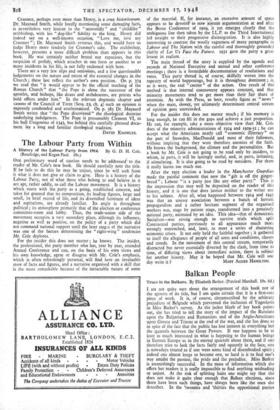The Labour Party from Within
A History of the Labour Party from 1914. By G. D. H. Cole. (Routledge, and Kegan Paul. 18s.) A History of the Labour Party from 1914. By G. D. H. Cole. (Routledge, and Kegan Paul. 18s.) ONE preliminary word of caution needs to be addressedL to the reader of Mr. Cole's new hook. He should carefully note the title. If he fails to do this he may be unjust, since he will seek from it what it does not give or claim to,give. Here is a history of the Labour Party, not of what those who belong to and believe in it are apt, rather oddly, to call the Labour movement. It is a history which starts with the party as a going, established concern, and takes for granted that its composition, its leading figures, large and small, its brief record of life, and its diversified furniture of ideas and aspirations, are already familiar. Its angle is throughout political ; its atmosphere primarily that of the election or conference committee-room and lobby. Thus, the trade-union side Of the movement occupies a very secondary place, although its influence, negative as well as positive, on the policy of a party which did not command national support until the later stages of the narrative was one of the factors determining the " right-wing " tendencies Mr. Cole deplores.
For the insider this does not matter ; he knows. The insider, the professional, the party member who has, year by year, attended Annual Conference and can, on the basis of -his own views and his own knowledge, agree or disagree With Mr. Cole's emphasis, which is often refreshingly personal, will find here an invaluable store of facts and figures, and a narrative organised with a skill that is the more remarkable because of the intractable nature of some of the material. If, for instance, an excessive amount of space appears to be devoted to now jejeune argumentation at and after the Berne Conference of 1919, it yet emerges clearly that the ambiguous line then taken by the I.L.P. to the Third International led straight to their progressive disintegration. It is also highly interesting to contrast the woolly vagueness of many paragraphs in Labour and The Nation with the careful and thoroughly grounded clarity of Let Us Face the Future. 1931 gave the party a great lesson in realism.
- The main thread of the story is supplied by' the agenda and records of National Executive and annual and other conference meetings there is a formidable documentation of resolutions and votes. This party thread is, of course, skilfully woven into the tapestry of World happenings, but it is thrmighout dominant' is, as it were, the real " carrier " of the action. One result of this method is that internal controversy appears constant, and that minority movements tend • to get more than their fair share of attention. As with the Press, so here' revolts figure as "news" when the main, slower, yet ultimately determinant central stream of opinion goes unrecorded.
For the insider this does not matter much ; if his memory is long enough, he can fill in the gaps and achieve a just proportion. He can, for example, take a more objective view than Mr. Cole does of the minority administrations of 1924 and 1929-31 ; he can accept what the Americans neatly call "economic illiteracy" on the part of Snowden, 'MacDonald and most of their followers, without implying that they were therefore enemies of the faith. He knows the background, the climate and the personalities. But a book by Mr. Cole is not going to _be read only by_insiders, to wit-Om, in parts, it will be lastingly Useful, and, in parts, irritating, if stimulating. It is also going to be read by outsiders:- For them it really leaves too much out.
After the 1931 election a leader in the Manchester Guardian made the painful comment that now the "gilt is off the ginger- bread" ; Labour "is a party just like any other party." This is the impression that may well be deposited on the reader of this history, and it is one that does justice neither to the' writer nor to his subject. After all, what happened between .1914 and 1945 was that an uneasy association between a bunch of fe.rvent propagandists and a _rather hesitant segment of the organised workers was, stage by patient stage, transformed into a genuinely national party, animated by au idea. This idea—that of demeeratic Socialism—was strong . enough to survive trials which split Continental parties, previously to all appearance much more strongly entrenched, and, later, to meet a series of shattering economic crises. It not only held the faithful together ; it gathered to itself the allegiance of people of all sorts and conditions, classes and creeds. In the movement of this central stream, temporarily distracted but never essentially diverted by the clash, from time to time, of differing views about immediate action, there is subject for another history. May it be hoped that Mr. Cole will one


































 Previous page
Previous page